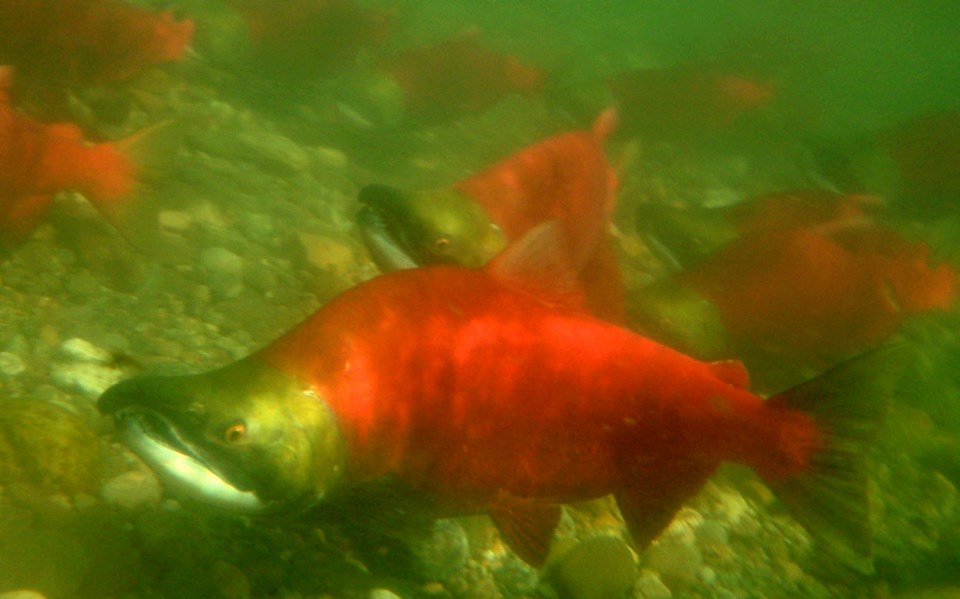 It sounds like just another example of the NDP government shunting an issue into the study/consultation process, a stage that’s starting to look like a crowded parking lot.
It sounds like just another example of the NDP government shunting an issue into the study/consultation process, a stage that’s starting to look like a crowded parking lot.
But the wild-salmon advisory council announced by Premier John Horgan on Friday is a sound idea, if only because any move at all on salmon is better than nothing.
Numerous interest groups will be represented on a council, to be beefed up by a staffed secretariat, some of them from the premier’s office. It’s charged with writing an options paper on a “made-in-B.C. wild-salmon strategy.”
True, it’s another public agency entering the crowded field of bureaucracies handling salmon files.
True, it will just file a report to yet another committee.
True, salmon are mostly a federal responsibility, and provincial representatives don’t have a lot of real clout on the key fishery issues.
But a purely B.C. group taking a concentrated look at the problems of the province’s bellwether natural resource might add some value to the never-ending debate about what to do about its decline. Particularly when the federal government is in the midst of trying to beef up salmon protection (Bill C-68).
One of the big ifs is whether the council can keep its act together and present some kind of cohesive report. That’s the job of co-chairs NDP MLA Doug Routley (Nanaimo-North Cowichan) and Marilyn Slett, elected chief of the Heiltsuk First Nation on the central coast.
Green Party MLA Adam Olsen (Saanich North-the Islands) will likely also be a guiding hand. He focused on salmon during the recent legislative session, and was invited to be a part of the announcement.
The need to hang together was the reason Horgan deflected questions about the big fishery decision coming up next week. Eleven leases for fish farms in the Broughton Archipelago expire next week. Anti-fish-farm pressure groups have zeroed in on the net pens, and looked last year to have caught the NDP’s attention with calls to shut them down.
Agriculture Minister Lana Popham was firmly onside with the protesters, and warned the leaseholders last year about sensitivities around the leases.
But the new advisory council could give the government room to renew the leases on a month-to-month basis.
Horgan acknowledged the divide over net-pen salmon farms, and said only that talks with opposing First Nations there are continuing and Popham will have more to say in the days ahead.
His effort to skate past the divisive issue didn’t go over well. Net-pen protester Tsastilqualus was a bystander at the announcement and she loudly berated him.
“This is nothing but a farce. Wake up. You sold us out.”
Horgan told her: “You’re welcome to put your name on a ballot any time soon.”
Separately, he sounded optimistic about a visit two of his staff made to Ottawa this week. He said they laid out conclusively the need for co-operation on the fishery.
In Ottawa, that could translate to: “We want to elbow in on your jurisdiction.”
They’re also believed to have lobbied for more spending on salmon.
Federal Fisheries Minister Dominic LeBlanc might show up in B.C. in the next few weeks, which would establish if they were successful.
The new council has sizable Indigenous representation, along with sports-fishery members, salmon-enhancement groups and what’s left of the commercial fleet. Eleven sectors are represented, and Routley, Slett and Olsen bring the membership to 14. No aquaculture groups are on the council.
It will present a report to a legislature committee on agriculture, fish and food that was reactivated last month.
Olsen is in a unique position, because he’s on the council and also on the committee to which it will report. He stressed the urgency that’s needed on the issue. The council will be a stronger, more powerful voice than exists currently, he said.
The federal Department of Fisheries and Oceans says there has been a “dramatic decline” in chinook in recent years. It imposed an instant closure on parts of the southern Gulf Islands and specific parts of Juan de Fuca Strait to chinook salmon fishing two weeks ago, citing the need to protect the food for orcas.
Horgan said the targeted closures “don’t make sense,” and Olsen also disputed them.



